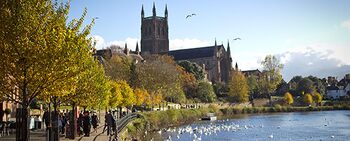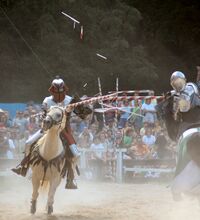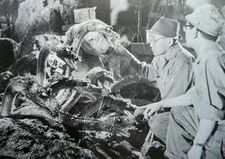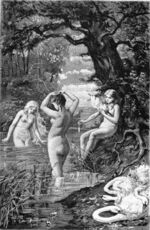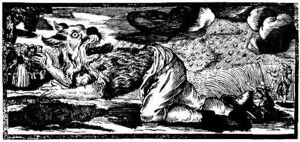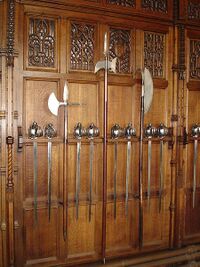Worcester, England
- This article is about the city. For something to pour onto swan lasagne, see Worcestershire sauce.
Worcester (pronounced "Woo-ster"), also known locally as "Wu, Glorious Wu", is a city and high-street consumer colony of Worcestershire, in the West Middle countryside of England. Often overshadowed by its noisy neighbour Birmingham, Worcester is mother to a brand of porcelain, Worcestershire sauce, and a Royal brothel, and was the setting for the blockbusting grand finale of the English Civil War.
Worcester is twinned with the Vatican City, due to its importance to the Catholic faith as the site where a virgin swan laid a clutch of eggs, which Pope Boniface IV ate in an omelette. The eggs were later depicted in a series of works commissioned by the Vatican and painted by religious artist Salvador Dali.
History
Worcester has, since it was founded by the Inland Revenue in Roman Britain as a self-assessment form assessment centre, proved to be an exemplary embodiment of the characteristics of British virtue: possessing a stiff upper lip, prudence, honesty, righteousness and a love of cricket. It is this, along with its strict observance to the Ten Commandments, which have preserved the city throughout the centuries in much the same material and societal condition as it was in the Dark Ages. It is considered so historic that experts from the popular UK TV series Antiques Roadshow have been known to solicit the area, often disguised as rental-car salesmen in bear costumes, in appreciation of the fine antiquated decor and historical tales. Voltaire held the city with such contempt because of its ties with the Catholic Church that he described it as "the ugliest use of the word cest since incest".
The city's emblem is the swan, which was first introduced to the river Severn by the Saxons after they had used them to cross the North Sea, following the collapse of Worcester's cricket team under the officiation of the Western Roman Umpire. Up to 500 swans per vessel were tied together to create rafts used for transporting people, cattle, buildings and practice netting for batsmen.
Architecture
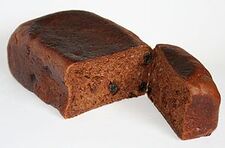
Located in the city's God-worshipping epicentre is the largest cathedral in Worcestershireian England. Designed in reaction to the Pope's disillusionment over the mock-Tudor housing craze in England during the Middle Ages, notable features include a stained-glass depiction of Christ rising above a semi-detatched home with the external black beams clearly distinguishable as mock-Tudor. Melody Maker nicknamed it the Sisters of Mercy cathedral in 1983 in a nod to its gothic architecture.
Its crumbling walls have played ears to music from the cantanas of Bach to the panting of Black Country doom-monger Ozzy Osbourne, who once broke into the grounds at night and performed an illegal sex act with a swan. Its grounds were the site of the largest monk parkour contest ever held in Europe.
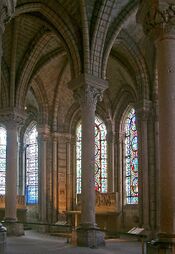
Emily Brontë fans claim to have decoded Wuthering Heights after discovering that much of the novel's imagery is virtually identical to the architecture of Worcester cathedral. From this they deduced that the story actually represents the insane ramblings of a virgin called Cathy (abbreviation of "Catholic girl") from a mental asylum after she has had a spiritual epiphany during a religious sermon. In this awakening she becomes attracted to and sexually frustrated by a black gothic pillar in the cathedral, which she nicknames Heathcliff (another code word used by Brontë as a sexual euphemism). When Cathy pleads "let me in-a your window" she is actually referring to breaking the metaphysical barriers that exists between her, a young virgin, and Heathcliff, a cold, stone-faced, yet inviting inanimate object. The black pillar still exists today but is draped in lamb's wool to prevent young girls from becoming enamoured with it.
Next to the cathedral is the glorious rich cocoa-brown-sand, neo-maltloafian architecture of the Heart of Worcestershire College (HOW), one of several buildings in the West Midlands made entirely from chocolate wafers and malt loaf, along with Bournville Village in Birmingham. The adjacent belltower St. Andrews Spire, or The Lover's Needle, was erected in 1973 by carving away at a huge concrete-block using a technique involving soothsaying and astrology. On the bell-end of the needle nests a happy, fluffy little family of swan hawks who keep the pigeon and swan population under control on behalf of the council.
The University of Worcester was built using rubble left over from the deconstruction of the social theories of Michel Foucalt by English philosopher Keith Chegwin.
Geography
The River Severn
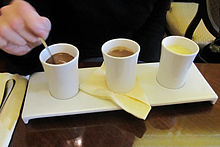
Worcester is connected with the sea by the river Severn network (so named because of the seven shades of brown the river changes to throughout the year). Cadburys, based in Birmingham, have irrigated the river upstream to pump water into their chocolate factory, causing innumerable environmental problems, which is what gives the river its notable colour. The river provides recreational activities such as access to water sports, which include rowing gaily downstream in quaint boats and fountain jumping, as well as a marvellous swannery.
On any of the 3 days of sunshine a year in western England, residents can be seen strolling along the banks of the Severn, taking in the sights and sounds of the once Roman, now Tory, settlement. Kenneth Grahame often spoke fondly about spending his childhood by the riverside and described in his biography how he escaped from boarding school in Worcester by hijacking a steam train, which inspired his hit TV series, The Wind In The Willows.
Flooding
As any estate agent would say, don't worry about flooding. The last severe flood occurred at the turn of the 21st century and was celebrated by local chocolatiers for bringing a vital ingredient to their products — rich dark cocoa silt — after a decade-long drought. According to locally-born composer Edward Elgar "there is something romantic, no, intensely pleasurable and quintessentially English about life in a partially submerged Atlantis".
William Wordsworth was also an admirer of the city during peak-flooding and in a postcard to his friend William Butler Yeats wrote: "There is little more wondrous a thing in nature than to be awoken in the morning by the calming sound of water trickling along the hallway and under the doorstep of your bed and breakfast, with the faint ruffling noises of moorhens mating against the windowsill in the background."
Transport and economy
As of 2016, there are plans to build a runway over Worcester racecourse to allow for light aircraft to land near the city centre. There are two train stations in Worcester, Foreplay Street and Bushy Hill. A rivalry between the two stations, going back to the days of William The Conqueror, sees railway workers competing in a yearly jousting competition. In this derby, the losers are decapitated, with their heads displayed on the railings outside the victorious train station.
Britain's only fully-candlelit bus station is to be found in Worcester, situated under a multi-level car park which serves the shopping plaza. The road system is spiral-shaped which means drivers entering the city must circle around it several times to reach the middle. This central hub is home to the city's best-known landmark, the Tudor-built Crowngate Shopping Centre, affectionately known as "The Dyson" because of its efficiency at drawing people into its vortex. Dyson Perrins Church of England school, founded in the nearby town of Malvern for slightly holier children, is twin-named after the "The Dyson" and the founder of Worcestershire Sauce, reggae producer Lea "Scratch" Perrins.
Due to the absence of any notable industry other than Worcestershire sauce, cricket and tanning salons, the city has a large labour pool available. Replete with grammar schools, body-builders and teeming with infrastructure, Worcester has the potential to be a real economic player within the West Midlands, and according to Financial Times is "the perfect location for the businessman and the investor to dip their toes into the market of protein supplements for scholarly men".
Trainspotters
Worcester and its neighbouring hives are accessible by high-speed train from Didcot and are buzzing with railway enthusiasts, who like nothing better than to harvest their bee-loved train nectar.
A local pressure group was formed by motorists in 2005, who successfully lobbied the council into creating a special bus route stopping at every train station in the county. This route was designed specifically to prevent the high volume of trainspotters in the area from clogging up the roads in their cars. Due to cuts to public funding however, the service now only runs on Sundays when the trains have stopped running because of works on the line.
People
Worcesterians are known to be friendly, kind-hearted folk, however, many are not well adjusted to the idea of a crossing between mainland Europe and England. The city's numerous religious schools follow their own curriculum and teach that the English Channel is a natural water-border created by God to keep out the French. As such, locals are taught to dislike strangers, particularly foreigners, and thus, while thawing to visitors, they can be known to make racial slurs. These, however, are completely unintended and are due to ignorance and a lack of inhibition rather than anything sinister.
Due to their hairy feet (which inspired author J.R.R. Tolkien's characterisation of the Hobbits during a trip to Worcestershire), the people of Worcester are particularly self-conscious and sensitive to jokes regarding their appearance. They are often heard talking about their afternoon feet-grooming sessions, which are followed by a nap (the equivalent of a Mediterranean siesta).
Homelessness
Worcester is home to some of the last remaining Anglo-Saxon and Roman high-street shop fronts in Britain. Many of these are now partially or fully obscured by rough sleepers. As of 2002, the council has attempted to make the town more presentable by training a flock of attack-swans to patrol the high-street and to sound an alarm honk to annoy any person found sleeping there, rather than tackle what is still the biggest cause of homelessness in the area — the English Civil War.
Religion
Spirituality
Religion is deeply entwined with Worcester's history. The city was originally founded on the site of a field where Moses is believed to have played cricket. Worcester cathedral is the largest building in the county, despite being held together entirely by prayers. In Dante's The Divine Comedy, Worcester's swans are the reincarnated forms of angels who committed accidental suicide by jumping from Heaven and landing on the A449 instead of their intended destination, the Dead Sea.
In a survey on spirituality held at the county cricket ground during a concert by Cher, 85% of the population responded 'yes' to a questionnaire on whether they believed in life after love.
The Church of Rave
The Christian denomination, the Church of Rave, can be found throughout most semi-rural parts of Britannia and has been in existence in Worcester since the excommunication of Bez from the Catholic Church.
A traditional ceremony held by the Church and observed by many young worshippers throughout Britain, involves imbibing vodka before heading to a field with loud invocations played through a PA system and then swallowing whichever foods (colloquially: "pill-drugs") are offered there. This represents the symbolic ritual of eating and drinking the body and blood of Christ in Christianity.
Priests from Worcester cathedral host regular sermons combining a theological approach to raving along with practical advice such as how to distinguish different pills and tabs (for example: those marked with an X represent the cross and ego death. An egg = rebirth and gentle come down). Drinks workshops involving recipes for cocktails and mixers are held by a local friar who also invented the first Bloody Mary, naming it after the Virgin Mary because of her regular cocaine-induced nosebleeds.
Culture
The Legend of St. Andrew The Fox Hunter
In Worcesterian legend, a gigantic fox demon with slimy fur, eel-like eyes and wearing beige chinos, laid siege to the city, attacking the helpless citizens almost at random with its deadly fangs. The streets ran with blood and cries pierced the night for many years until a valiant hunter named Andrew flew down from the sky on the back of a Pegasus with a pack of angel-hounds at his side and drove the monster out of the city. Before it could escape to the nearby safety of Stourbridge, the hounds revenged the people of Worcester by ravaging the fox into pieces of orange felt with globules of meat attached.
Andrew became a saint in 1450 and is now considered one of the city's most revered historic figures for making fox hunting a popular pastime in England and Wales. He has a spire in the city, a brand of fur-lined arseless chaps for horse riders, as well as a Royal prince named after him. A plaque was erected above the oldest butcher shop in Worcester to commemorate his daring dead pig initiation ceremony, a stunt later mimicked by Prime Minister of the UK David Cameron.
Fox hunting
Thanks to the internet, a new generation of children has discovered the exploits of St. Andrew and developed a thirst for fox hunting. Given its historical significance and its lively combination of fun, adventure and jolly good traditional values, many locals agree that its a tragedy to see the extinction of fox hunting in England. While local hunts still operate on New Years Day, Boxing Day and during Glastonbury Festival weekend when most animal rights activists are off their tits or lying face down in the mud, it is now illegal to give chase to a fox unless it is painted gold or with black stripes so as to appear like a lion or a tiger. This practice of painting foxes explains many of the big cat sightings throughout the UK.
Pubs and nightlife
As is typical of any British settlement, there are more pubs in Worcester than restaurants, people and atoms. Ale houses in the area act primarily as a refuge and tonic for walking on the city's uneven cobbled streets. The mayor of Worcester is often seen exercising his mayoral duties in these establishments, ensuring that they are kept in accordance with strict supply laws.
The city is a popular hotspot for clubbers in the county, who go to clubberland to escape from the banality of Tudor life, avant-garde performance art and polishing their bespoke cutlery. In clubberland, folk dressed as Oompa Loompas (a phenomenon widely believed to have been started by the inventor of a lentil-based curry, Roald Dahl) wiggle their hips or jive on the dance floor to banging sounds (colloquialism for "good music") set to an understated swing rhythm called the flip-flop-a-floodle, which has given rise to an area-specific musical subculture of the same name. These "sounds" are mixed seamlessly together by a person known as the DJ, usually a guest E-list celebrity or cricketer.
Worcester's elderly population frequent a number of hot cocoa bars where velvety chocolate-flavoured caramel and nougat beverages are served to live music by authentic Roman and medieval tribute acts dressed in period costumes such as the Roman Legion Eagles, Fleetwood Maximillius and The Doobie Brothers Re-Tudored.
Crime
Policing
In keeping with Worcester's historic past, the West Mercia Constabulary are famous (infamous to criminals) for making their presence felt and not just seen. By implementing medieval torture techniques such as waterboarding on nasty groups of criminals, known as "street gangs", they have helped to sustain some of the lowest crime rates for drug trafficking, public exposure and parking offences in the whole county.
To ensure that the civic area is a safe, law-abiding place for shoppers, police tactics also include good-old public beatings and hangings outside the Corn Exchange if they are unable to chase the criminal to his or her own death by falling into the swan-infested river. Worcester is one of the last remaining localities in England to use a set of fully-operational stocks funded by the taxpayer.
Gangs
Many of the gang members in Worcester are direct descendants of Harold Godwinson and the Duke of Wellington. The fearsome reputation that proceeds them is hogwash as all members observe the codes of English battle etiquette including cordial handshakes, hand-written apology letters as well as demonstrating chivalrous conduct towards their opponents wives by bowing in their presence. Rival factions can often be spotted together off-duty sharing a flask of hot Bovril.
Prostitution
Prostitution is rife in the area, with approx 4,000 female and male escorts (around 1 in 20 residents) registered on escorting websites. Due to the influx of penniless sports nutrition students at the university, the sex market has become saturated and escorts have been known to offer their bodies in exchange for a little as a slice of vegan date and walnut cake or in some cases, electrolytes.
Exchanging money for sex is legal in Worcester, providing that the sex worker is not under the age of 16 or an unregistered farm animal, although that does not stop many underage girls and anonymous cattle from being illegally wed to local constabulary and barmen.
| Featured version: 24 October 2016 | |
| This article has been featured on the main page. — You can vote for or nominate your favourite articles at Uncyclopedia:VFH. | |
